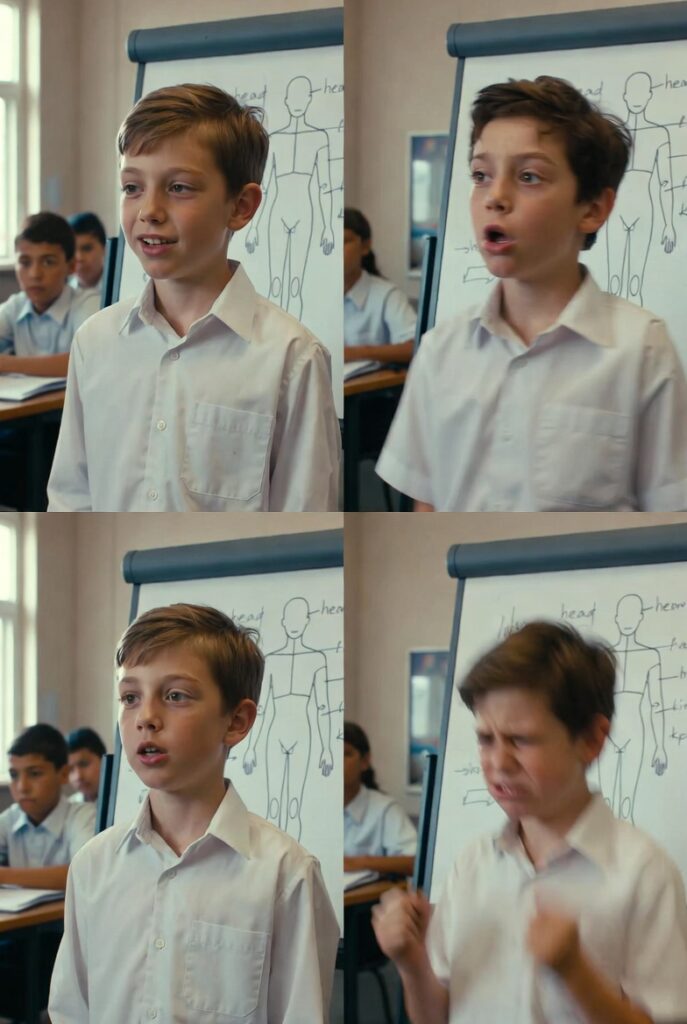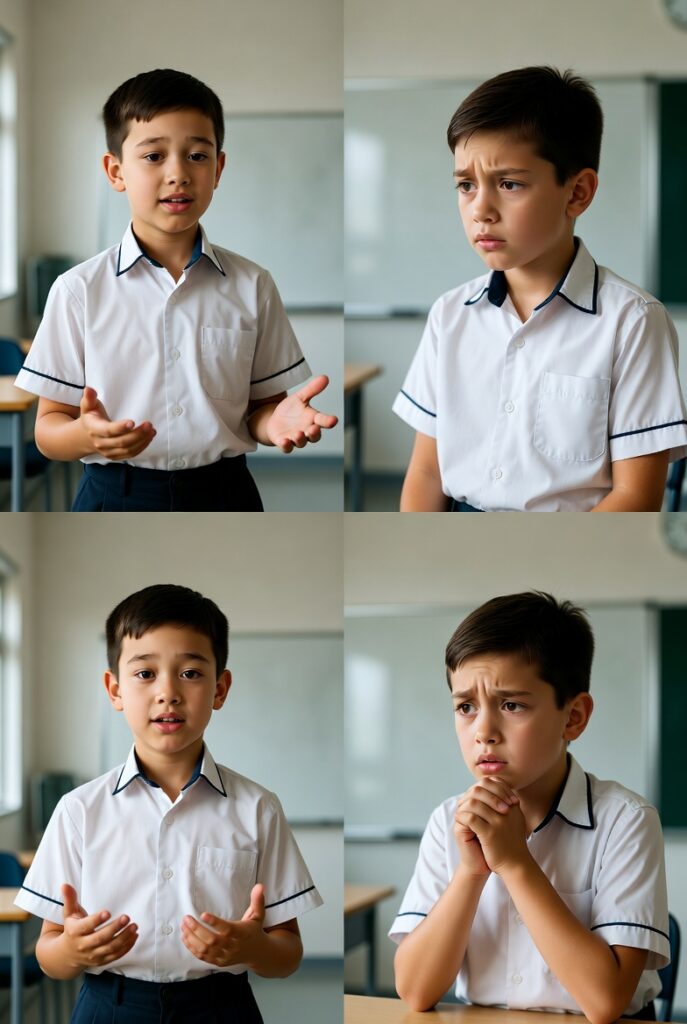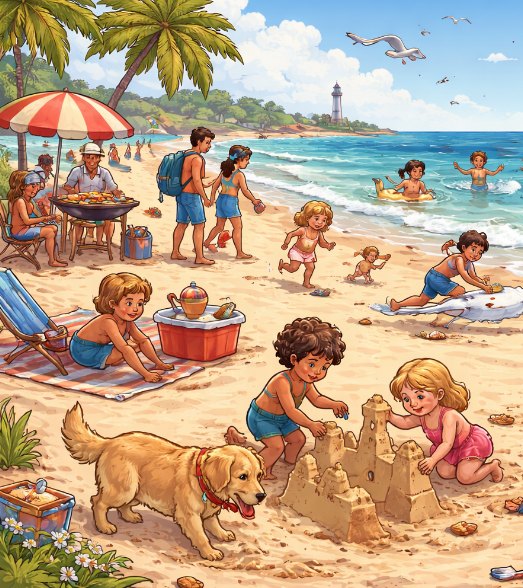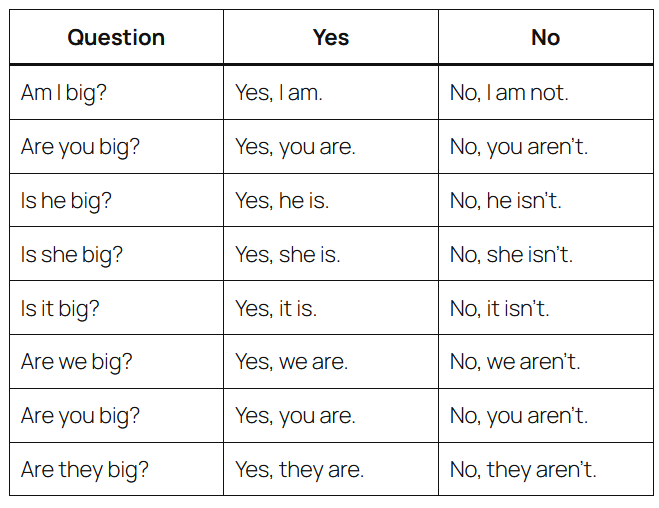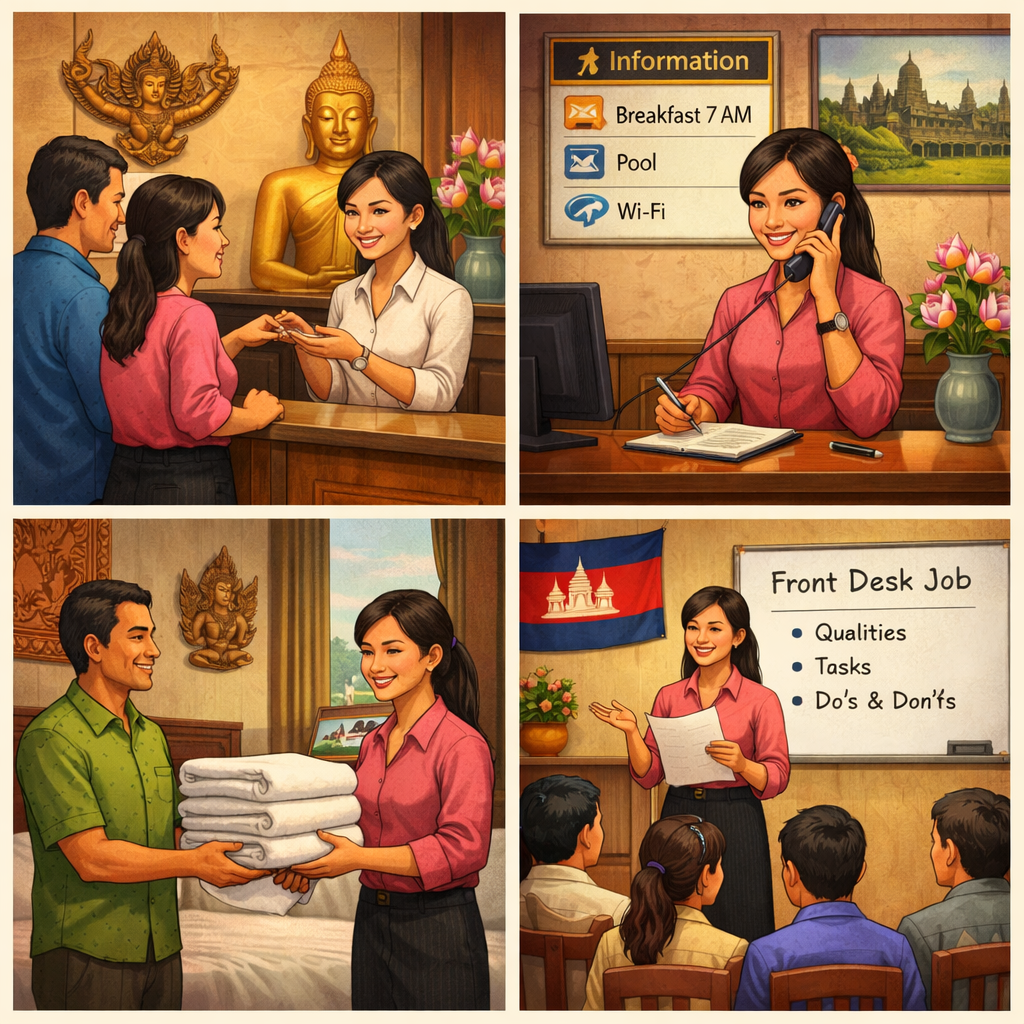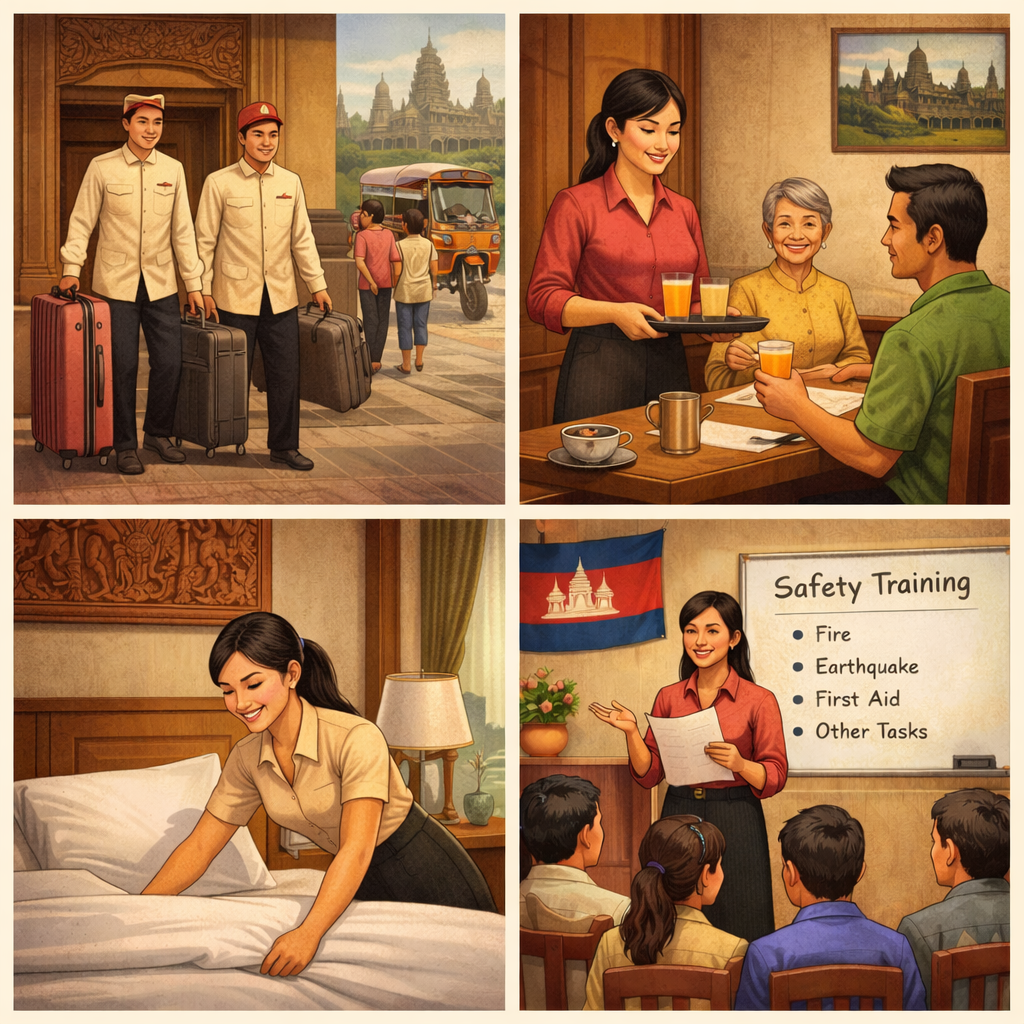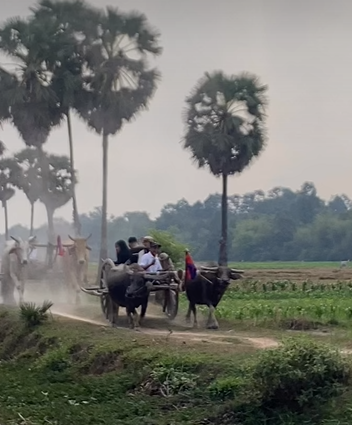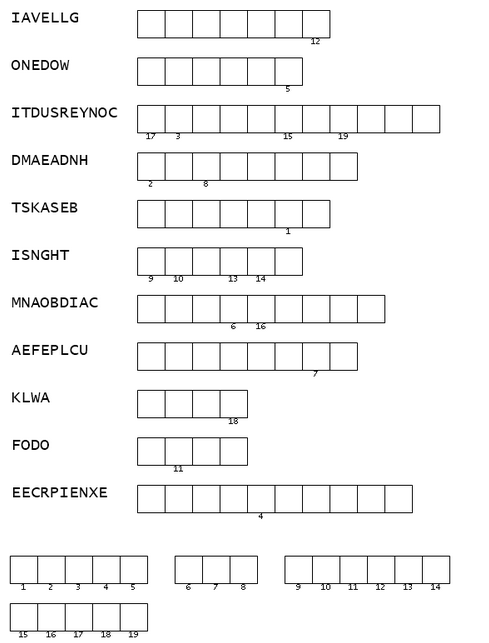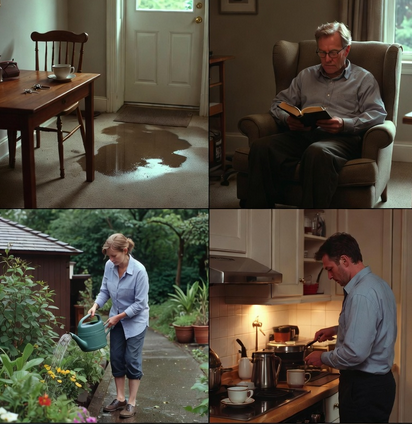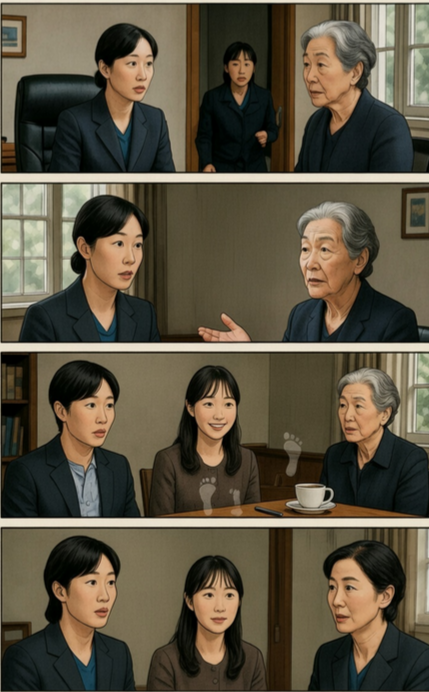
| Deutsch | English | Definition |
|---|---|---|
| eine Tierart | a kind of animal | a type of animal, like a dog, cat, or panther |
| Haut | skin | the outside part of an animal’s body |
| Fell | fur | the soft hair on an animal’s body |
| Fleck | a spot | a small round mark on an animal’s skin or fur |
| Dschungel | a jungle | a very big forest with many trees and animals |
| einen Baum klettern | to climb a tree | to go up a tree using hands and feet |
| sich vor Gefahr verstecken | to hide from danger | to stay safe so no one or no animal can hurt you |
| sich in einem Baum ausruhen | to rest in a tree | to stop and sleep or relax in a tree |
| Fleischfresser | a carnivore | an animal that eats meat |
| Hirsch | a deer | a wild animal with four legs and antlers |
| Jäger | a hunter | a person or animal that looks for animals to catch or eat |
| jagen | to hunt | to look for and catch animals to eat |
| meistens | mostly | usually or most of the time |
| sich im Dunkeln verstecken | to hide in the dark | to stay where it is very dark so no one can see you |
| sich leise bewegen | to move quietly | to walk or go without making noise |
| weit springen | to jump far | to move from one place to another in the air a long distance |
| Lärm machen | to make noise | to make a sound |
| brüllen | to roar | a very loud sound that an animal makes |
| beschützen | to protect | to keep someone or something safe |
| Tiere erschrecken | to scare animals | to make animals afraid |
| Junges | a cub | a baby animal, like a baby panther or bear |
| sich um etwas kümmern | to take care of something | to help and watch something so it is safe and healthy |
| am Leben erhalten | to keep alive | to help something stay alive |
| zerstören | to destroy | to break something or make it stop existing |
| in Gefahr sein | to be in danger | to be in a situation where you can be hurt or die |
| Abholzung | deforestation | cutting down many trees in a forest |
| illegal sein | to be illegal | something that is against the law |
| zusammenfassend | in conclusion | at the end, when you say the final idea |
| stark sein | to be powerful | to have a lot of strength or ability |
| respektieren | to respect | to be kind and careful with someone or something |
| schützen | to protect | to keep safe from danger or harm |
#################
The black panther is a big and strong wild animal. It is very beautiful and very fast. The black panther is not a different kind of animal. It is a leopard or a jaguar with black color. The black color comes from the skin and the fur. Sometimes, if the sun is bright, you can see spots on its body. These spots are like the normal leopard or jaguar.
Black panthers live in warm places. They live in forests and jungles. Some live in Africa, some in Asia, and some in South America. They like places with many trees. Trees are important for them. Panthers can climb trees and hide from danger. They also rest in trees during the day.
The black panther is a
carnivore.
This means it eats meat. It eats animals like deer, birds, and small animals. The black panther is a very good hunter. It hunts mostly at night. At night, it can see very well. Its black color helps it hide in the dark. When it moves quietly, other animals do not see it.
The black panther is very fast and strong. It can run quickly and jump far. It can also climb very high. Sometimes, it jumps from tree to tree. It is very quiet. It does not make much noise. But when it wants, it can roar. Its roar is very loud. It uses the roar to protect its home or to scare other animals.
Black panthers usually live alone. They do not live in groups like lions. They meet other panthers only to have babies. A baby panther is called a cub. The mother panther takes care of her cubs. She teaches them how to hunt and how to live in the forest. Cubs stay with their mother for a long time. Then, they go to live alone.
The black panther is important for nature. It helps keep the forest alive. It controls the number of other animals. Without black panthers, some animals can eat too much food and destroy the forest.
Today, black panthers are in danger. People cut the forests to build houses and roads. This is called deforestation. It is very bad for panthers. Some people also hunt black panthers for their fur. This is illegal in many countries, but it still happens. We must protect the black panther and its home.
In conclusion, the black panther is a beautiful, strong, and smart animal. It is quiet, fast, and powerful. It lives in forests and jungles, hunts at night, and climbs trees very well. We should respect black panthers and protect the forests where they live.
###############
Match word and definition, part 1:
Words:
- a kind of animal
- skin
- fur
- a spot
- a jungle
- to climb a tree
- to hide from danger
- to rest in a tree
- a carnivore
- a deer
- a hunter
- to hunt
- mostly
- to hide in the dark
- to move quietly
- to jump far
- to make noise
Definitions
A. to go up a tree using hands and feet
B. usually or most of the time
C. a very big forest with many trees and animals
D. an animal that eats meat
E. to stay where it is very dark so no one can see you
F. to walk or go without making noise
G. a type of animal, like a dog, cat, or panther
H. to look for and catch animals to eat
I. a wild animal with four legs and antlers [horns]
J. a person or animal that looks for animals to catch or eat
K. the outside part of an animal’s body
L. to make a sound
M. a baby animal, like a baby panther or bear
N. the soft hair on an animal’s body
O. to stay safe so no one or no animal can hurt you
P. to stop and sleep or relax in a tree
Q. a small round mark on an animal’s skin or fur
R. to move from one place to another in the air a long distance
________________
Answers
1-G, 2-K, 3-N, 4-Q, 5-C, 6-A,
7-O, 8-P, 9-D, 10-I, 11-J, 12-H,
13-B, 14-E, 15-F, 16-R, 17-L
###########
Match word and definition, part 2:
Words (18–32):
18. to roar
19. to protect
20. to scare animals
21. a cub
22. to take care of something
23. to keep alive
24. to destroy
25. to be in danger
26. deforestation
27. to be illegal
28. in conclusion
29. to be powerful
30. to respect
31. antlers
Definitions:
A. a baby animal, like a baby panther or bear
B. to keep safe from danger or harm
C. at the end, when you say the final idea
D. to break something or make it stop existing
E. to be in a situation where you can be hurt or die
F. cutting down many trees in a forest
G. something that is against the law
H. a very loud sound that an animal makes
I. to have a lot of strength or ability
J. to be kind and careful with someone or something
K. to help and watch something so it is safe and healthy
L. to make animals afraid
M. to help something stay alive
N. the big, hard branches on the head of some animals, like a deer
___________________
Answers:
18-H, 19-B, 20-L, 21-A, 22-K,
23-M, 24-D, 25-E, 26-F, 27-G,
28-C, 29-I, 30-J, 31-N
##############
True or False:
- Panthers eat deer and birds.
- Panthers move quietly when they hunt.
- Panthers cannot jump far.
- Panthers climb trees to hide from danger.
- Antlers [horns] are on black panthers.
- Panthers mostly hunt during the day.
- Panthers rest in trees during the day.
- Panthers usually live in groups.
- A cub is a baby panther.
- Panthers are always safe in the forest.
- Black panthers are powerful animals.
- It is legal to hunt black panthers.
- Panthers have spots that are sometimes visible [can be seen] in sunlight.
- Panthers have no fur.
- To protect the panther means to keep it safe from danger.
- Deforestation makes it easier for panthers to live.
- Panthers usually live alone.
- Panthers are carnivores.
- Panthers have black fur.
____________________
Answers:
1-T, 2-T, 3-F, 4-T, 5-F, 6-F, 7-T,
8-F, 9-T, 10-F, 11-T, 12-F, 13-T,
14-F, 15-T, 16-F, 17-T, 18-T, 19-T
___________________
Correct version:
- Panthers eat deer and birds.
- Panthers move quietly when they hunt.
- Panthers cannot jump far. True is: Panthers can jump far.
- Panthers climb trees to hide from danger.
- Antlers are on black panthers. True is: Antlers are on deer, not panthers.
- Panthers mostly hunt during the day. True is: Panthers mostly hunt at night.
- Panthers rest in trees during the day.
- Panthers usually live in groups. True is: Panthers usually live alone.
- A cub is a baby panther.
- Panthers are always safe in the forest. True is: Panthers are often in danger because of humans.
- Black panthers are powerful animals.
- It is legal to hunt black panthers. True is: Hunting black panthers is illegal.
- Panthers have spots that are sometimes visible in sunlight.
- Panthers have no fur. True is: Panthers have black fur.
- To protect the panther means to keep it safe from danger.
- Deforestation makes it easier for panthers to live. True is: Deforestation destroys panther homes.
- Panthers usually live alone.
- Panthers are carnivores.
- Panthers have black fur.
##################
Fill in, words below:
at night – keep it safe – fur – animals –
deer – trees – forest – rest – alone –
spots – hunt – meat-
black – food –
cub
- The black panther is a strong carnivore that eats __________.
- Black panthers have black __________ that sometimes has small spots.
- A __________ is a baby panther that stays near its mother.
- Panthers climb __________ to hide from danger and to rest safely.
- Panthers __________ in trees during the day and wait quietly.
- Panthers move quietly when they __________ other animals.
- Panthers mostly hunt __________ when it is dark.
- Panthers usually live __________ and do not stay in groups.
- Panthers can jump far to catch their __________.
- Panthers eat animals like __________ in the forest or jungle.
- Panthers have ___________ on their fur that can sometimes be seen in the sunlight.
- To protect the panther means to __________ from danger and hunters.
- Deforestation destroys the __________ and makes it hard for panthers.
- Hunting __________ panthers is illegal [not allowed]
- Black panthers are very powerful __________ and people must respect them.
_______________________
Correct version:
- The black panther is a strong carnivore that eats meat.
- Black panthers have black fur that sometimes has small spots.
- A cub is a baby panther that stays near its mother.
- Panthers climb trees to hide from danger and to rest safely.
- Panthers rest in trees during the day and wait quietly.
- Panthers move quietly when they hunt other animals.
- Panthers mostly hunt at night when it is dark.
- Panthers usually live alone and do not stay in groups.
- Panthers can jump far to catch their food.
- Panthers eat animals like deer in the forest or jungle.
- Panthers have spots on their fur that can sometimes be seen in the sunlight.
- To protect the panther means to keep it safe from danger and hunters.
- Deforestation destroys the forest and makes it hard for panthers.
- Hunting black panthers is illegal.
- Black panthers are very powerful animals and people must respect them.
#################

Connect the sentences:
- The black panther is a carnivore
- A cub is a baby panther
- Panthers climb trees
- Panthers rest in trees
- Panthers move quietly
- Panthers mostly hunt at night
- Panthers usually live alone
- Panthers can jump far
- To protect the panther
- Hunting black panthers
Second Part:
A. to keep it safe from danger.
B. that sometimes has spots on its fur.
C. when it is dark.
D. to hide from danger and rest safely.
E. and wait quietly during the day.
F. to catch their food.
G. and do not stay in groups.
H. is illegal and against the law.
I. that stays near its mother.
J. when they hunt other animals.
____________________
Answers:
1-B, 2-I, 3-D, 4-E, 5-J, 6-C,
7-G, 8-F, 9-A, 10-H
____________________
Corrrect sentences:
- The black panther is a carnivore that sometimes has spots on its fur.
- A cub is a baby panther that stays near its mother.
- Panthers climb trees to hide from danger and rest safely.
- Panthers rest in trees and wait quietly during the day.
- Panthers move quietly when they hunt other animals.
- Panthers mostly hunt at night when it is dark.
- Panthers usually live alone and do not stay in groups.
- Panthers can jump far to catch their food.
- To protect the panther is to keep it safe from danger.
- Hunting black panthers is illegal and against the law.
################
Answer:
- Does a black panther eat plants or meat?
YOU WRITE:
A black panther eats meat. - Is a baby panther called a cub or a deer?
_______________________________ - Does a panther rest in a tree or on the ground?
_______________________________ - Can a panther climb a tree or a mountain?
_______________________________ - Does a panther hunt at night or during the day?
_______________________________ - Does a panther move quietly or loudly when it hunts?
_______________________________ - Does a panther usually live alone or in groups?
_______________________________ - Does a panther eat a deer or grass?
_______________________________ - Is it legal or illegal to hunt black panthers?
_______________________________ - Does a panther have fur or antlers [horns]?
_______________________________
——————————–
Correct answers:
- A black panther eats meat.
- A baby panther is called a cub.
- A panther rests in a tree.
- A panther can climb a tree.
- A panther hunts at night.
- A panther moves quietly when it hunts.
- A panther usually lives alone.
- A panther eats a deer.
- It is illegal to hunt black panthers.
- A panther has fur.
###############

BONUS DIALOGUE
Interview with an expert on the black panther
Q: What is a black panther?
A: The black panther is a big and strong wild animal. It is very beautiful and very fast.
Q: Is the black panther a different kind of animal?
A: No, the black panther is not a different kind of animal. It is a leopard or a jaguar with black color.
Q: Where does the black color come from?
A: The black color comes from the skin and the fur.
Q: When can we see spots on its body?
A: Sometimes, if the sun is bright, you can see spots on its body.
Q: What are these spots like?
A: These spots are like the normal leopard or jaguar.
Q: Where do black panthers live?
A: Black panthers live in warm places.
Q: Do they live in forests and jungles?
A: Yes, they live in forests and jungles.
Q: Which places do they live in?
A: Some live in Africa, some in Asia, and some in South America.
Q: Why are trees important for them?
A: They like places with many trees. Trees are important for them.
Q: What can panthers do with trees?
A: Panthers can climb trees and hide from danger.
Q: Where do they rest during the day?
A: They rest in trees during the day.
Q: What does the black panther eat?
A: The black panther is a carnivore. This means it eats meat.
Q: What animals does it eat?
A: It eats animals like deer, birds, and small animals.
Q: Is the black panther a good hunter?
A: Yes, the black panther is a very good hunter.
Q: When does it hunt?
A: It hunts mostly at night.
Q: How does it see at night?
A: At night, it can see very well.
Q: How does its black color help it?
A: Its black color helps it hide in the dark.
Q: How is the black panther’s body?
A: The black panther is very fast and strong.
Q: What can it do when it moves?
A: It can run quickly and jump far.
Q: Can it climb and jump in trees?
A: It can climb very high. Sometimes, it jumps from tree to tree.
Q: Is it noisy?
A: It is very quiet. It does not make much noise.
Q: When does it roar?
A: When it wants, it can roar. Its roar is very loud.
Q: Why does it use the roar?
A: It uses the roar to protect its home or to scare other animals.
Q: Do black panthers live in groups?
A: No, black panthers usually live alone.
Q: When do they meet other panthers?
A: They meet other panthers only to have babies.
Q: What is a baby panther called?
A: A baby panther is called a cub.
Q: Who takes care of the cubs?
A: The mother panther takes care of her cubs.
Q: What does the mother teach the cubs?
A: She teaches them how to hunt and how to live in the forest.
Q: How long do cubs stay with the mother?
A: Cubs stay with their mother for a long time.
Q: Why is the black panther important for nature?
A: The black panther is important for nature. It helps keep the forest alive.
Q: What happens without black panthers?
A: Without black panthers, some animals can eat too much food and destroy the forest.
Q: Are black panthers in danger today?
A: Yes, today, black panthers are in danger.
Q: Why is deforestation bad for panthers?
A: People cut the forests to build houses and roads. This is called deforestation. It is very bad for panthers.
Q: Do people hunt black panthers?
A: Some people hunt black panthers for their fur.
Q: Is this legal?
A: This is illegal in many countries, but it still happens.
Q: What should we do?
A: We must protect the black panther and its home.
#########################
#########################
Interview with a black panther
Q: Hello, black panther. Can you tell me about yourself?
A: Hello. I am a black panther. I am big and strong. I am very fast and very quiet. I am also very beautiful.
Q: Are you a different kind of animal?
A: No. I am not a different kind of animal. I am a leopard or a jaguar with black color.
Q: Why is your color black?
A: My black color comes from my skin and my fur. When the sun is bright, you can see spots on my body.
Q: Where do you live?
A: I live in warm places. I live in forests and jungles. Some of us live in Africa, some in Asia, and some in South America.
Q: Why are trees important for you?
A: Trees are very important. I can climb trees and hide from danger. I also rest in trees during the day.
Q: What do you do at night?
A: At night, I hunt. I can see very well at night. My black color helps me hide in the dark.
Q: What animals do you eat?
A: I eat meat. I eat deer, birds, and small animals. I am a very good hunter.
Q: Are you loud or quiet?
A: I am very quiet. I do not make much noise. But sometimes I roar. My roar is very loud.
Q: Why do you roar?
A: I roar to protect my home or to scare other animals.
Q: Do you live with other black panthers?
A: No. I usually live alone. I do not live in groups like lions.
Q: What about baby panthers?
A: A baby panther is called a cub. The mother panther takes care of her cubs. Cubs stay with their mother for a long time.
Q: What problems do you have today?
A: Today, we are in danger. People cut the forests. This is called deforestation. It is very bad for us.
Q: Is hunting a problem?
A: Yes. Some people hunt us for our fur. This is illegal in many countries, but it still happens.
Q: What do you want people to know?
A: We are important for nature. We help keep the forest alive. People must protect us and our home.


 Good luck!
Good luck!